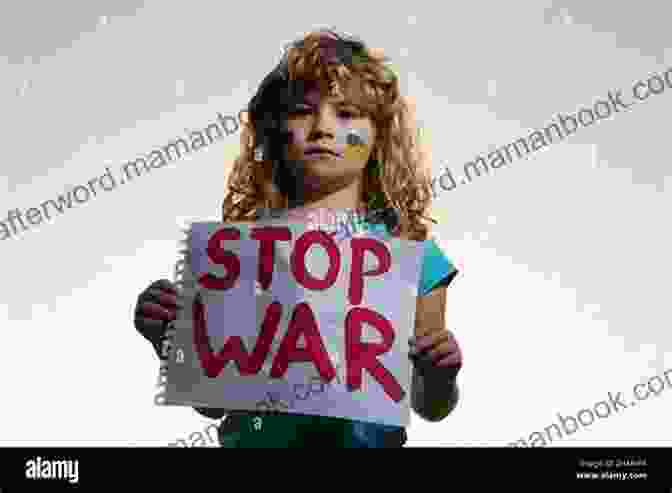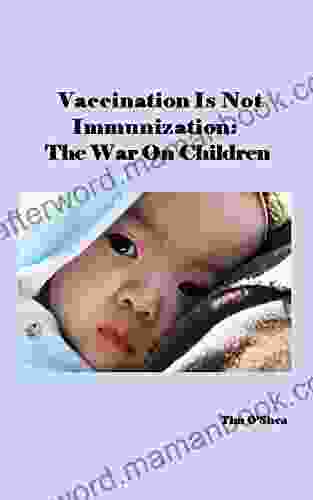The War on Children: A Critical Examination of Socioeconomic and Political Factors Impacting Child Well-being


4.2 out of 5
| Language | : | English |
| File size | : | 4244 KB |
| Screen Reader | : | Supported |
| Print length | : | 222 pages |
| Lending | : | Enabled |
Children are the most vulnerable members of our society, and they deserve our utmost care and protection. However, for many children in the United States, the reality is far from ideal. Poverty, inequality, and systemic barriers create significant challenges for children's well-being. The War on Children: 5th Ed Fifth Edition 2024 provides an in-depth analysis of the socioeconomic and political factors impacting child well-being in the United States.
This comprehensive report examines the historical and current context of the war on children, providing a detailed account of the policy failures, systemic issues, and societal attitudes that contribute to the ongoing crisis. It also presents evidence-based solutions and advocates for collective action to improve child outcomes.
Systemic Issues
The war on children is rooted in systemic issues that create barriers to child well-being. These include:
- Poverty: Poverty is the single most significant predictor of poor child outcomes. Children living in poverty are more likely to experience hunger, homelessness, and inadequate healthcare. They are also more likely to drop out of school and become involved in the juvenile justice system.
- Inequality: Income inequality has widened in the United States in recent decades, and this has had a devastating impact on children. Children from wealthy families have access to better opportunities than children from poor families, which leads to disparities in education, health, and other areas.
- Racism: Racism is a systemic issue that affects children of color in the United States. Children of color are more likely to live in poverty, attend underfunded schools, and experience discrimination in the juvenile justice system.
- Disability: Children with disabilities face significant challenges in the United States. They are more likely to live in poverty, experience discrimination, and have difficulty accessing education and healthcare.
- Intersectionality: The experiences of children who face multiple forms of oppression, such as racism and poverty, are particularly challenging. These children are more likely to experience adverse outcomes than children who only face one form of oppression.
Policy Failures
In addition to systemic issues, policy failures have also contributed to the war on children. These failures include:
- Lack of affordable housing: The United States has a severe shortage of affordable housing, which makes it difficult for families to find safe and stable places to live. This can have a devastating impact on children, who need a stable home environment to thrive.
- Underfunded education: Public schools in the United States are underfunded, which leads to larger class sizes, fewer resources, and lower quality education for children. This has a particularly negative impact on children from low-income families, who are more likely to attend underfunded schools.
- Inadequate healthcare: The United States does not have a universal healthcare system, which means that many children do not have access to the healthcare they need. This can lead to untreated illnesses, chronic health conditions, and even death.
- Mass incarceration: The United States has the highest incarceration rate in the world, and this has a devastating impact on children. Children who have a parent in prison are more likely to live in poverty, experience trauma, and drop out of school.
Societal Attitudes
Societal attitudes also play a role in the war on children. These attitudes include:
- Blaming the victim: Many people in the United States believe that children who are poor or experiencing other challenges are to blame for their own situation. This attitude makes it difficult to develop policies and programs that effectively address the needs of children.
- Apathy: Many people in the United States are simply apathetic about the war on children. They may not realize the extent of the problem, or they may not believe that anything can be done to solve it.
- Hostility: Some people in the United States are openly hostile towards children, particularly children who are poor or from marginalized communities. This hostility can lead to violence, discrimination, and other forms of abuse.
Solutions
The war on children is a complex problem, but it is not insurmountable. There are evidence-based solutions that can be implemented to improve child outcomes. These solutions include:
- Investing in early childhood education: High-quality early childhood education programs can help children get a strong start in life. They can improve children's cognitive, social, and emotional development and help them succeed in school and beyond.
- Providing affordable housing: All families deserve to have access to safe and affordable housing. Providing affordable housing can help children thrive and reach their full potential.
- Funding public education: Public schools are essential for providing children with a quality education. Funding public education can help ensure that all children have access to the resources they need to succeed.
- Expanding healthcare access: All children deserve to have access to quality healthcare. Expanding healthcare access can help children stay healthy and get the care they need to thrive.
- Reforming the juvenile justice system: The juvenile justice system is broken. It is a system that disproportionately impacts children of color and children from low-income families. Reforming the juvenile justice system can help ensure that children are treated fairly and have the opportunity to succeed.
The war on children is a serious problem that has devastating consequences for children in the United States. However, there are solutions to this problem. By working together, we can create a better future for all children.
Call to action: I urge you to learn more about the war on children and to get involved in efforts to improve child well-being. You can find more information at the following websites:
- Children's Defense Fund
- First Focus
- National Council for Children's Rights
4.2 out of 5
| Language | : | English |
| File size | : | 4244 KB |
| Screen Reader | : | Supported |
| Print length | : | 222 pages |
| Lending | : | Enabled |
Do you want to contribute by writing guest posts on this blog?
Please contact us and send us a resume of previous articles that you have written.
 Top Book
Top Book Novel
Novel Fiction
Fiction Nonfiction
Nonfiction Literature
Literature Paperback
Paperback Hardcover
Hardcover E-book
E-book Audiobook
Audiobook Bestseller
Bestseller Classic
Classic Mystery
Mystery Thriller
Thriller Romance
Romance Fantasy
Fantasy Science Fiction
Science Fiction Biography
Biography Memoir
Memoir Autobiography
Autobiography Poetry
Poetry Drama
Drama Historical Fiction
Historical Fiction Self-help
Self-help Young Adult
Young Adult Childrens Books
Childrens Books Graphic Novel
Graphic Novel Anthology
Anthology Series
Series Encyclopedia
Encyclopedia Reference
Reference Guidebook
Guidebook Textbook
Textbook Workbook
Workbook Journal
Journal Diary
Diary Manuscript
Manuscript Folio
Folio Pulp Fiction
Pulp Fiction Short Stories
Short Stories Fairy Tales
Fairy Tales Fables
Fables Mythology
Mythology Philosophy
Philosophy Religion
Religion Spirituality
Spirituality Essays
Essays Critique
Critique Commentary
Commentary Glossary
Glossary Bibliography
Bibliography Index
Index Table of Contents
Table of Contents Preface
Preface Introduction
Introduction Foreword
Foreword Afterword
Afterword Appendices
Appendices Annotations
Annotations Footnotes
Footnotes Epilogue
Epilogue Prologue
Prologue 2nd Edition Kindle Edition
2nd Edition Kindle Edition Gavin De Becker
Gavin De Becker Ben Mezrich
Ben Mezrich Kenneth Mcleish
Kenneth Mcleish Gi Gi
Gi Gi Jane Ziegelman
Jane Ziegelman Maureen Healy
Maureen Healy Bailey Booth
Bailey Booth Ray Grillo
Ray Grillo Robert Bly
Robert Bly Tim Deforest
Tim Deforest Juan Villalba
Juan Villalba Robert R Prechter
Robert R Prechter Scott Cooper
Scott Cooper Pope Leo Xiii
Pope Leo Xiii Barbara Wood
Barbara Wood Heather Mills Schwarzen
Heather Mills Schwarzen Suzy Pepper Rollins
Suzy Pepper Rollins Susan Perry Gurganus
Susan Perry Gurganus Franklin R Root
Franklin R Root
Light bulbAdvertise smarter! Our strategic ad space ensures maximum exposure. Reserve your spot today!
 Jonathan FranzenFollow ·11.7k
Jonathan FranzenFollow ·11.7k VoltaireFollow ·16.1k
VoltaireFollow ·16.1k Lucas ReedFollow ·4.3k
Lucas ReedFollow ·4.3k Andrew BellFollow ·3.5k
Andrew BellFollow ·3.5k Bradley DixonFollow ·3.7k
Bradley DixonFollow ·3.7k Steven HayesFollow ·11.8k
Steven HayesFollow ·11.8k Hamilton BellFollow ·14.3k
Hamilton BellFollow ·14.3k Devon MitchellFollow ·2.1k
Devon MitchellFollow ·2.1k

 Bryce Foster
Bryce FosterViolin Is Easy: A Comprehensive Guide for Beginners
The violin is a...

 Cristian Cox
Cristian CoxThe True Story Of The Ivy League Cowboys Who Raided The...
In the early 2000s, a group of Ivy League...

 Ken Follett
Ken FollettUnraveling the Enchanting World of Menewood: A...
Embark on an enthralling...

 Phil Foster
Phil FosterNorth Poems by Seamus Heaney: An Exploration of Place,...
Seamus Heaney's North...

 Jack Butler
Jack ButlerFleeting Encounters: The Enigmatic Transience of Maria...
In the annals of literary history, fleeting...

 Eliot Foster
Eliot FosterA Haiku Summer: Capturing the Essence of the Season in...
Summer is a time of warmth,...
4.2 out of 5
| Language | : | English |
| File size | : | 4244 KB |
| Screen Reader | : | Supported |
| Print length | : | 222 pages |
| Lending | : | Enabled |












